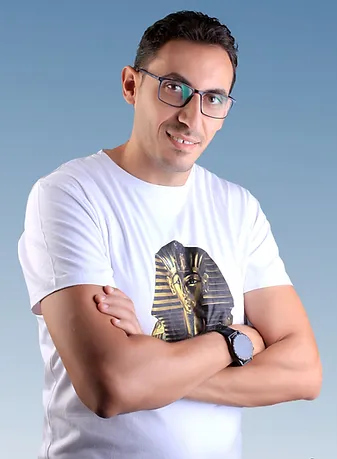talk like an egyptian

Egypt is a country rich in history, culture, and language. The Egyptian dialect of Arabic, known as "Masri," is widely spoken not only in Egypt but also in various parts of the Arab world. The Egyptian dialect has its own unique charm, mixing ancient traditions with modern influences. Whether you're visiting Cairo, Alexandria, or any other part of Egypt, you'll encounter many expressions and slang that give the language a distinct flair. Let's take a closer look at some of the most common Egyptian sayings and words that will help you "talk like an Egyptian."
1. "Ya Hala!" (يا هلا)
This is a friendly, welcoming phrase that is often used to greet someone. Similar to saying "Hello!" or "Welcome!" in English, it’s a great way to show warmth and friendliness. You might hear it often when entering a store or meeting someone for the first time.
2. "Forsa Sa'ida" (فرصة سعيدة)
A common phrase used when meeting someone or as a way to say "nice to meet you." It literally translates to "happy opportunity," and it reflects the Egyptian culture’s welcoming nature.
3. "Mish Mushkila" (مش مشكلة)
This phrase means "No problem" or "It's okay." It’s often used to reassure someone or to show that there are no issues, even when things may seem complicated. Egyptians are known for their laid-back attitude, and this phrase reflects that relaxed approach to life.
4. "Inshallah" (إن شاء الله)
This expression, meaning "God willing," is used to express hope or expectation for something to happen in the future. It’s often used when making plans or discussing potential events. For example, if someone asks you when you’ll visit Egypt, you might say, "Inshallah," implying you hope it will happen.
5. "Habibi/Habibti" (حبيبي/حبيبتي)
A term of endearment, "Habibi" (for males) or "Habibti" (for females) means "my dear" or "my beloved." It’s commonly used between friends, family members, or even strangers as a way to show affection or closeness. In Egypt, it's not uncommon for people to greet each other with these terms, regardless of their relationship.
6. "Keteer" (كتير)
This word translates to "a lot" or "many." Egyptians often use it when referring to quantity or frequency, such as "keteer mashroo‘at" (a lot of projects) or "keteer asdiqa'" (many friends).
7. "Wala Ya'ni" (ولا يعني)
Meaning "It doesn't matter" or "Never mind," this phrase is commonly used to express indifference or to dismiss something trivial. It's often used when a situation isn't worth stressing over, reflecting the relaxed attitude of many Egyptians.
8. "Eih Da?" (إيه دا؟)
This is the Egyptian way of saying "What is this?" It’s used to express surprise, wonder, or even a bit of confusion. Egyptians often use it when something is unusual or unexpected, and it's a fun expression to use when you find something particularly intriguing.
9. "Masha'Allah" (ما شاء الله)
This phrase, meaning "As God has willed," is often used to express admiration or to praise something or someone. It's a way of acknowledging something positive or beautiful without showing envy, and it's also used to ward off the "evil eye."
10. "Ahlan wa Sahlan" (أهلاً وسهلاً)
This classic phrase means "Welcome," and it’s often used to greet guests, whether in homes or at businesses. It’s one of the most famous expressions in Arabic and has a universal feel in many Arabic-speaking countries, but it’s especially common in Egypt.
11. "Shukran" (شكراً)
Although this word simply means "Thank you," it’s important to note that Egyptians often say it in a very heartfelt manner. You’ll hear "shukran" many times when you’re interacting with locals, whether they’re serving you in a restaurant or helping you in the streets.
12. "Ana Mesh Fahem" (أنا مش فاهم)
This phrase means "I don’t understand." If you’re struggling to keep up with the fast pace of conversation, this is the perfect phrase to use to let people know that you need clarification.
13. "Yalla" (يلا)
One of the most iconic Egyptian expressions, "Yalla" is used to say "Let’s go" or "Come on." It’s extremely versatile and can be used to encourage someone to hurry up, to invite them to join you, or even to express excitement about doing something. It’s a lively word that reflects the dynamic, spirited nature of Egyptians.
14. "Ana Zei El-Fil" (أنا زي الفيل)
This phrase translates to "I’m like the elephant" and is a playful expression used to indicate feeling strong or having a great amount of energy. It’s often said with humor or when joking around with friends.
15. "Bashmohandas" (باشمهندس)
Literally meaning "Engineer," this title is often used as a sign of respect, even for people who aren't engineers. It’s an Egyptian way of addressing someone politely, and it’s common to hear it in both formal and informal settings.
Conclusion
Learning to talk like an Egyptian is more than just picking up a few words or expressions; it’s about understanding the local culture, warmth, and hospitality. By using these phrases, you’ll not only speak the language, but also connect with Egyptians in a more personal and authentic way. So next time you’re in Egypt, give these expressions a try and see how they bring you closer to the heart of this vibrant and welcoming culture.
- Art
- Causes
- Crafts
- Dance
- Drinks
- Film
- Fitness
- Food
- Jocuri
- Gardening
- Health
- Home
- Literature
- Music
- Networking
- Alte
- Party
- Religion
- Shopping
- Sports
- Theater
- Wellness


